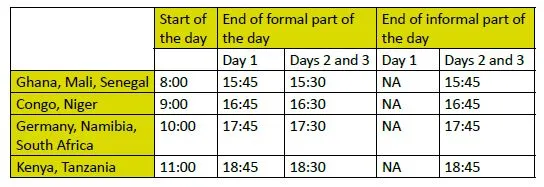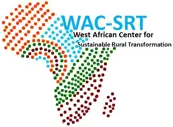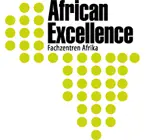Thematic groups
I. Trajectories of Economic Development
Chair: Elkhan Richard Sadik-Zada
1. Promoting development of small entrepreneurs under the East African Treaty Framework: an assessment of achievements and challenges (Petro Protas, Tanzanian German Center of Excellence for Law)
2. Coordination of COVID-19 response and economic recovery policy among partner states under EAC Law (Otieno Kennedy Abuya, Tanzanian German Center of Excellence for Law)
3. Eradicating absolute poverty through creating decent jobs? (Wilhelm Löwenstein, South-African German Center of Development Research)
II. Labor, Migration and Human Trafficking
Chair: Nicksoni Filbert
1. Regulating Labor Externalization in the East African Community (Evelyn Happy Katono, Tanzanian-German Center of Excellence for Law)
2. Organ trafficking in Nigeria: an emerging dimension of the human trafficking across Sub-Saharan Africa (Deborah Damilola Adeyemo, Nigeria, Alumna (2013) South African-German Center for Transnational Criminal Justice)
3. Analysis of the effectiveness of the legal and institutional framework for fighting human trafficking in Malawi (Gabriel Chambezi, Alumnus (2010) South African-German Center for Transnational Criminal Justice)
III. Climate Change and Rural Transformation - Part I
Chair: Rabani Adamou
1. The role solar panels can play in managing scarce water resources (Ulrike Feistel, Philipp Marx, Jakob Ebermann, Susanna Kettner, Laurence Wagner, Saddam Ali Khokhar, Nikhil Sharma and Dhruv Thaker, Kenyan-German Center for Mining, Environmental Engineering and Resource Management)
2. Adapted climate services for water, energy and food security in rural areas (Aboubacar Issaka Ousman Gaoh, Rabani Adamou and Wolfram Laube, West African-German Center for Sustainable Rural Transformation)
3. Achieving net-zero carbon emissions goal in 21st Century: Legal Approaches for full onboarding of developing states (Omondi R. Owino, Otieno N. Okeyo, (AEN) Alumni of the Tanzanian-German Center of Excellence for Law)
IV. Climate Change and Rural Transformation - Part II
Chair: Michael Ayamga
4. Carbon credit trade management and community livelihood improvement in Taita Taveta County (Catherine Ndungu, Kenyan-German Center for Mining, Environmental Engineering and Resource Management)
5. People, Global Change and Livelihoods in sub-Saharan Africa: Building Livelihood Resilience to Climate Change through Local Knowledge Systems in Rural sub-Saharan Africa (Emmanuel K. Derbile, West African-German Center for Sustainable Rural Transformation)
6. Climate change, rural transformation: what role for the youth? (Wolfram Laube, Ghanaian-German Center for Development Research and West African German Center for Sustainable Rural Transformation)
V. Agricultural Transformation and Food and Nutrition Security - Part I
Chair: Emmanuel K. Derbile (tbc)
1. Continuing on the road to ending hunger in Africa: Exclusionary food systems and transformative attempts (Julian May and Anne Siebert, South African-German Center for Development Research)
2. Introducing certified safe cabbage into traditional food markets in Tamale, Ghana: actual buyer characteristics, market demand, producers’ profits and recommendations for the design of suitable certification schemes (Christina Seeger, Ibrahim Mustapha, Pay Drechsel, Halim Abubakari, Wilhelm Löwenstein South African-German Center for Development Research)
3. Agricultural Commercialization and Smallholder Enhancement in Northern Ghana: Does the Contract Farming Model Work? (Michael Ayamga and Jongare Imoru Adams, Ghanaian-German Center of Excellence for Development Studies)
VI. Agricultural Transformation and Food and Nutrition Security - Part II
Chair: Julian May
4. Urban agriculture as food security coping strategy for urban households in Bulawayo, Zimbabwe (Merton Ziga, (AEN) Alumnus of the South African-German Center for Development Research)
5. Inequalities in food security and nutritional outcomes in middle income countries in sub-Saharan Africa (Corettah Jonah and Winnie Sambu (AEN) alumnae of the South African-German Center for Development Research)
6. Rural-urban transformation effects on ecosystem services in Sub-Saharan Africa - TransformAfrica (Andreas Buerkert, Eva Schlecht, Martin Wiehle, Christoph Gornott, Promoting Academic Capacities for Sustainable Agricultural Resource use in West Africa)
7. Women and the ‘violence’ of Development: Peripherization of women voices in Uganda’s socio-economic Development (Eria Serwajja, (AEN) South African-German Center for Development Research)*
*Although in the abstract book, this presentation did not happen. The author cancelled on short notice.
VII. Innovative Methodological Approaches in the CoAEs
Chair: Susan Kurgat
1. Research topics in ICT for sustainability (Jorge Marx Gómez, Center of Excellence for ICT in East Africa with Nelson Mandela African Institute of Science and Technology)
2. Challenges and best practices in social science field research in Africa – a multifactorial analysis based on case studies of research projects conducted (Helga Dickow, Oumarou Hamani, Clemens Schweizer, West African-German Center of Excellence for Local Governance in Africa)
3. Life cycle assessment for mining and minerals processing, LCA software and students capacity building (Jan Bongaerts, Kenyan-German Center for Mining, Environmental Engineering and Resource Management)
VIII. Exploring Education in and out of the Centers of African Excellence
Chair: Paul Webb
1. Critical Thinking, Problem Solving and Creativity in Teacher Education – mapping student teachers’ perspectives and competencies in Kenya, Tanzania, Uganda, South Africa and Germany (John Chang’ach, Susan Kurgat, East and South African-German Centre of Excellence for Educational Research Methodologies and Management)
2. Digitalizing postgraduate education and academic supervision at African universities: opportunities and limitations (Malve von Möllendorff, East and South African-German Center of Excellence for Educational Research Methodologies and Management, and Sonja Ebbing, DIGI-FACE coordinator at Oldenburg University)
3. A case study on the role and challenges of communication and cooperation in African Excellence projects (Elisa Adams, West African-German Center for Local Governance in Africa)
4. Quality management in the Centers of excellence (Antonia Vollmer, Wilma B. Houeto, Rachida Illou, West African-German Center for Local Governance in Africa)

There will be simultaneous translation during the first and third days, except for the breakout rooms and wonder.me.
At the end of days 2 and 3, there will be time for informal discussions between participants in breakout rooms (or wonder.me) – not mandatory, just an offer from the organizers. These time slots can be eliminated or extended, depending on the demand. There will be no professional simultaneous translation in the breakout rooms, but volunteers with good command of English and French (and who would like to help their colleagues) are welcome.




